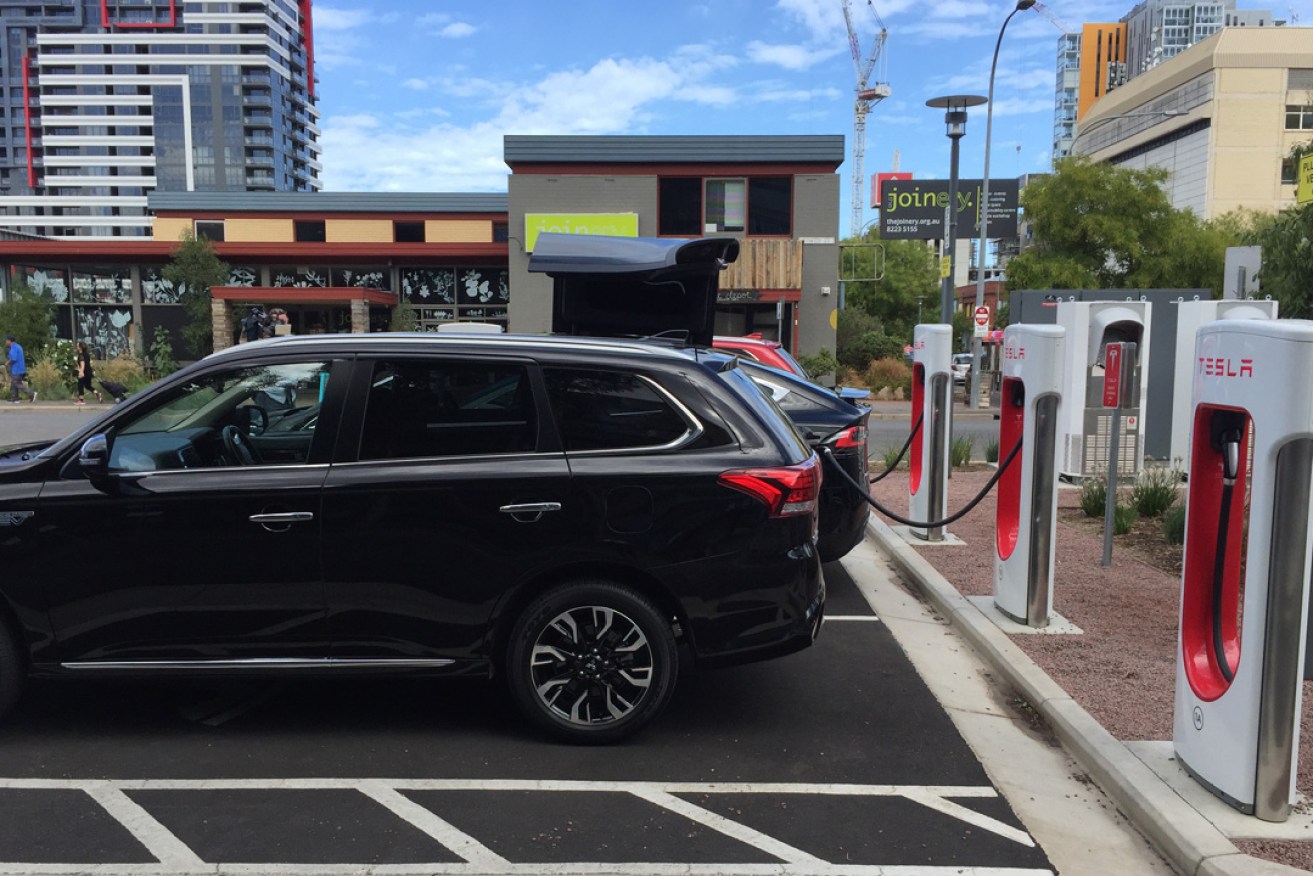SA near bottom of class with electric vehicle efforts
The State Government has been handed a “D” for its electric vehicle policies and initiatives, in a report card from the Australian Electric Vehicle Council.


Electric vehicles charging at the Franklin Street charging station in Adelaide's CBD. Photo: Bension Siebert / InDaily
The annual State of Electric Vehicles report, released today, for the first time graded Australian governments.
South Australia, Tasmania and Victoria all scored Ds, behind NSW and Queensland with C and the ACT, which took the top spot with a B.
Western Australia, the Northern Territory and the Federal Government were all handed Fs.
Electric Vehicle Council CEO Behyad Jafari told InDaily the report card was a reflection of the evidence-based policies and initiatives state and federal governments had enacted in support of electric vehicles.
He said states were judged on financial incentives to support electric vehicles purchases, industry strategies to assist the E-mobility sector, efforts on electric buses, fuel efficiency targets, electric vehicle targets and efforts around home and public electric vehicle charging.
“Particularly for South Australia, the issue is they’ve been looking at developing the strategy for some time,” Jafari said.
“The world and Australia has moved on since then and quite a few states have developed their strategies and are implementing them successfully. The fact that South Australia is still at that point pushed them back a bit.”
The South Australian government last year moved to develop an Electric Vehicle Action Plan.
Between May and July 2019, it sought consultation on a strategy intended to form the basis for policy relating to the roll out of charging and hydrogen refuelling infrastructure, public transport and electricity demand.
A State Government spokesperson said the final touches were being applied to its electric vehicle strategy.
“The South Australian Government is currently finalising an Electric Vehicle Action Plan. It is anticipated that the Electric Vehicle Action Plan will be released later this year,” a government spokesperson said.
In its report, the EVC said it expected to see scores improve in the next 12 months with electric vehicle strategies under development in SA, Victoria, NT, WA and federally.
Jafari said for governments to increase their rating they would need to move towards a 5 per cent market share in the sector.
“Because we’ve got successful markets around the world, we’re able to benchmark what other countries were doing as well and what that looked like … whether it’s the USA or across Europe or Asia, they’re the sort of markets that are around 5 per cent market share for electric vehicles,” Jafari said.
“We’re at less than 1 per cent in Australia – which is the same as in SA – so therefore we’re not doing a good enough job.”
According to the report, Australia’s market share for new plug-in electric vehicles sold in 2019 lagged behind other developed nations at 0.6 per cent.
Globally electric vehicles equated to 2.5 per cent of all new vehicles sold, with developed nation sales averaging between 2.5 and 5 per cent. Norway was an exception where electric vehicles accounted for 56 per cent of new car sales.
In Australia, overall electric vehicle sales tripled from 2216 in 2018 to 6718 in 2019. It came despite a 7.8 per cent fall in combustion engine sales in the same period.
The report found electric vehicle sales in 2020 remained steady with an estimated 3226 sold in the first half of the year, despite a 20 per cent decline in overall new vehicle sales.
Victoria and New South Wales had the highest total number of sales in 2019, with 815 and 832 respectively.
But ACT outperformed the other states in the percentage of new car sales for every 10,000 vehicles sold, with 83 per cent coming from electric vehicles, while South Australia came in second at 61 per cent with 412 sales.
As part of the State of Electric Vehicles report, the EVC also examined consumer sentiment towards electric vehicles, surveying 2902 Australians across South Australia, NSW, ACT and Victoria.
It found 56 per cent of respondents would consider purchasing an electric vehicle as their next vehicle – an increase from 48 per cent in 2018 and 53 per cent in 2019.
Respondents cited environmental footprints, lower running and maintenance costs among their reasons for an electric vehicle purchase, while the price of electric vehicles discouraged purchases.
EVC said this concern should be dissipated as the price of electric vehicles became comparable to its petrol and diesel equivalents.
It said parity could be reached sooner with the introduction of national fuel efficiency standards, similar to countries such as the UK and US.
“We’re quite hopeful because the path for South Australia from B to A is very clear and it’s a pretty simple one,”Jafari said.
“The good thing is, what we’ve heard from South Australians is that they want all of these things to happen. They want their next car to be electric and it’s recognising South Australia, like the rest of Australia, competes on a global market for the latest technology.
“So, when the government gets on with providing policies to support people getting into electric vehicles, it will be well received both by the industry and by their consumers.”
Want to comment?
Send us an email, making it clear which story you’re commenting on and including your full name (required for publication) and phone number (only for verification purposes). Please put “Reader views” in the subject.
We’ll publish the best comments in a regular “Reader Views” post. Your comments can be brief, or we can accept up to 350 words, or thereabouts.




